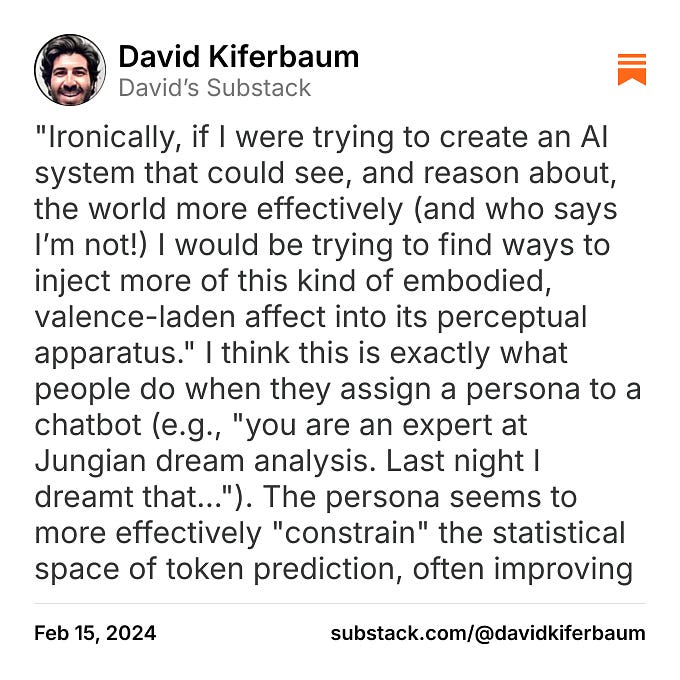franklantz.substack.com/p/affect-is-protocol/comment/49649319
Preview meta tags from the franklantz.substack.com website.
Linked Hostnames
2Thumbnail

Search Engine Appearance
David Kiferbaum on Donkeyspace
"Ironically, if I were trying to create an AI system that could see, and reason about, the world more effectively (and who says I’m not!) I would be trying to find ways to inject more of this kind of embodied, valence-laden affect into its perceptual apparatus." I think this is exactly what people do when they assign a persona to a chatbot (e.g., "you are an expert at Jungian dream analysis. Last night I dreamt that..."). The persona seems to more effectively "constrain" the statistical space of token prediction, often improving output quality. It's possible that we're all socially encouraged to do this, take on expertise that implicitly narrows our affect in order to improve the quality of our labor output. The humanities sort of acknowledge this by (ideally) broadening our conceptual space and supposedly enriching the experience of life (before eventually being pushed into expertise). To that end, seems like market forces might be a drag for humans and for AI.
Bing
David Kiferbaum on Donkeyspace
"Ironically, if I were trying to create an AI system that could see, and reason about, the world more effectively (and who says I’m not!) I would be trying to find ways to inject more of this kind of embodied, valence-laden affect into its perceptual apparatus." I think this is exactly what people do when they assign a persona to a chatbot (e.g., "you are an expert at Jungian dream analysis. Last night I dreamt that..."). The persona seems to more effectively "constrain" the statistical space of token prediction, often improving output quality. It's possible that we're all socially encouraged to do this, take on expertise that implicitly narrows our affect in order to improve the quality of our labor output. The humanities sort of acknowledge this by (ideally) broadening our conceptual space and supposedly enriching the experience of life (before eventually being pushed into expertise). To that end, seems like market forces might be a drag for humans and for AI.
DuckDuckGo
David Kiferbaum on Donkeyspace
"Ironically, if I were trying to create an AI system that could see, and reason about, the world more effectively (and who says I’m not!) I would be trying to find ways to inject more of this kind of embodied, valence-laden affect into its perceptual apparatus." I think this is exactly what people do when they assign a persona to a chatbot (e.g., "you are an expert at Jungian dream analysis. Last night I dreamt that..."). The persona seems to more effectively "constrain" the statistical space of token prediction, often improving output quality. It's possible that we're all socially encouraged to do this, take on expertise that implicitly narrows our affect in order to improve the quality of our labor output. The humanities sort of acknowledge this by (ideally) broadening our conceptual space and supposedly enriching the experience of life (before eventually being pushed into expertise). To that end, seems like market forces might be a drag for humans and for AI.
General Meta Tags
16- titleComments - Affect is Protocol - by Frank Lantz
- title
- title
- title
- title
Open Graph Meta Tags
9- og:urlhttps://franklantz.substack.com/p/affect-is-protocol/comment/49649319
- og:typearticle
- og:titleDavid Kiferbaum on Donkeyspace
- og:description"Ironically, if I were trying to create an AI system that could see, and reason about, the world more effectively (and who says I’m not!) I would be trying to find ways to inject more of this kind of embodied, valence-laden affect into its perceptual apparatus." I think this is exactly what people do when they assign a persona to a chatbot (e.g., "you are an expert at Jungian dream analysis. Last night I dreamt that..."). The persona seems to more effectively "constrain" the statistical space of token prediction, often improving output quality. It's possible that we're all socially encouraged to do this, take on expertise that implicitly narrows our affect in order to improve the quality of our labor output. The humanities sort of acknowledge this by (ideally) broadening our conceptual space and supposedly enriching the experience of life (before eventually being pushed into expertise). To that end, seems like market forces might be a drag for humans and for AI.
- og:imagehttps://substackcdn.com/image/fetch/w_680,h_680,c_limit,f_auto,q_auto:good,fl_progressive:steep/https%3A%2F%2Fsubstack.com%2Fnote%2Fc-49649319%2Fpreview.jpeg%3Fsize%3Dsm
Twitter Meta Tags
8- twitter:label1Likes
- twitter:data12
- twitter:label2Replies
- twitter:data20
- twitter:titleDavid Kiferbaum on Donkeyspace
Link Tags
38- alternate/feed
- apple-touch-iconhttps://substackcdn.com/icons/substack/apple-touch-icon.png
- canonicalhttps://franklantz.substack.com/p/affect-is-protocol/comment/49649319
- iconhttps://substackcdn.com/icons/substack/icon.svg
- preconnecthttps://substackcdn.com
Links
14- https://franklantz.substack.com
- https://franklantz.substack.com/p/affect-is-protocol/comment/49649319
- https://franklantz.substack.com/p/affect-is-protocol/comments#comment-49649319
- https://substack.com
- https://substack.com/@davidkiferbaum/note/c-49649319